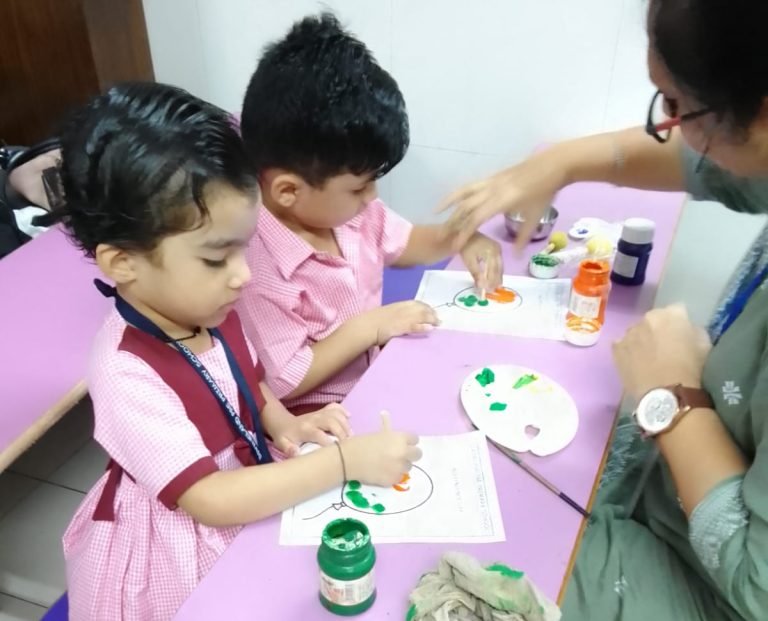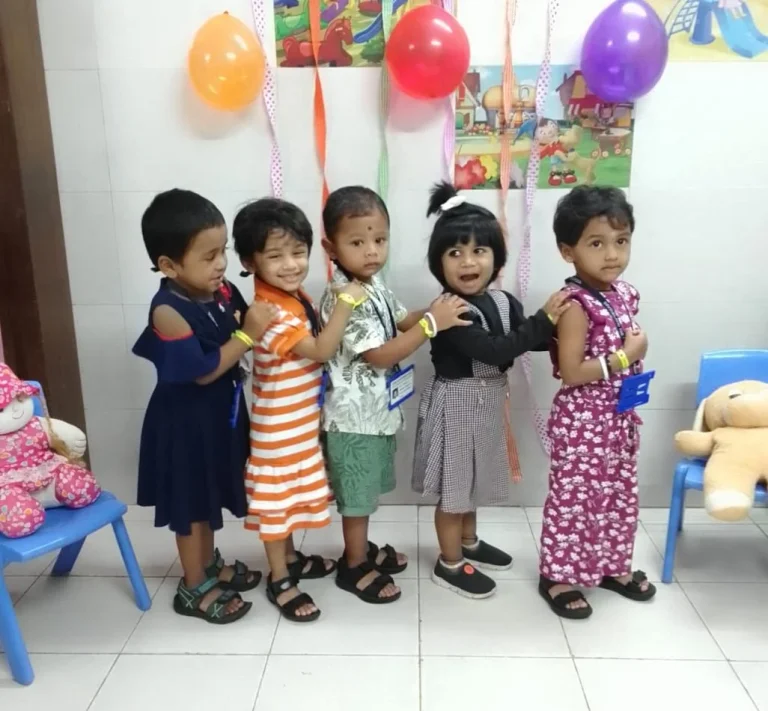
Phonics, is an important part in early childhood education, plays a crucial role in improving reading techniques among Upper Kindergarten (UKG) students. This articles digs into the importance of phonics for UKG, delineating actual methods and skills to assist young students in learning the art of reading.
Understanding Phonics
Phonics for UKG refers to the method of instructing learners to read by connecting sounds with letters or groups of letters. It is an essential step in developing learning skills, qualifying students to decode words and understand text.
Key Components of Phonics for UKG
Instructing phonics for UKG involves a strategic approaches of reading, where children’s are introduced to the Grounds of Phonics in a methodical manner.
Here is a detailed look at the key components:
Letter Recognition
In phonics for UKG, letter recognition is the first step.
It involves:
- Visual Identification: Children learn to identify each letter of the alphabet visually. This includes distinguishing between uppercase and lowercase letters.
- Sound Correlation: Each letter is associated with its phonetic sound. For instance, the letter ‘B’ is linked to the sound /b/.
- Repetition and Practice: Regular practice through alphabet charts, flashcards, and writing exercises solidifies this recognition.
- Integrating Phonics for UKG: Incorporating fun activities like letter tracing and matching games enhances the learning experience.
Sound Association
A core element of phonics for UKG is sound association, which encompasses:
- Single Letter Sounds: Understanding that every letter narrates to a separate sound.
- Digraphs and Blends: Presenting similar letter that make changed sounds, like ‘ch’ in ‘chip’ and ‘st’ in ‘star’.
- Phonemic Awareness: Improving the ability of listening, recognizing, and modify individual sounds (phonemes) in verbal language.
- Contextual Learning: Using phonics for UKG to create meaningful associations through stories and words that children encounter daily.
Blending
Blending is a vital skill in phonics for UKG, involving:
- Sound Combination: Teaching children to combine individual sounds (phonemes) to form complete words, such as /c-a-t/ to make ‘cat’.
- Progressive Learning: Starting with simple words and gradually moving to more complex ones.
- Interactive Techniques: Utilizing phonics for UKG games and activities that encourage blending sounds to form words.
- Application in Reading: Practicing blending skills through guided reading sessions.
Segmentation
Segmentation in phonics for UKG focuses on:
- Breaking Down Words: Knowledge of separate words into their basic sounds, which benefits in spelling and reading.
- Phonemic Awareness: Improving the capability to separate and recognize individual sounds in words.
- Spelling Skills: Using breakdown to advance spelling exactness and confidence.
- Phonics for UKG Exercises: Engaging in activities like clapping out syllables or using beads to represent sounds in words.
Sight Words
In phonics for UKG, sight words play a crucial role:
- High-Frequency Words: Introducing words that seem usually in sentence but do not always follow fixed phonics rules, like ‘the’, ‘said’, and ‘where’.
- Memorization: Inspiring memorization of these words to advance reading proficiency and ability.
- Contextual Usage: Providing ample opportunities to see and use these words in context.
- Integration with Phonics for UKG: Balancing the learning of sight words with phonetic decoding techniques.
By directing on these sides of phonics for UKG, teachers can make a comprehensive and effective reading activities that advances the foundation for future educational victory. The key is to make the learning process attractive and structured to the specific requirement of each child.
Get hands on details via call / WhatsApp on +919082778593 / +918591021373.
To download brochure, Click Here.
The Importance of Phonics in UKG
Phonics for UKG is far more than a simple method for learning to read; it is an initial support for future educational success. Its impacts is profound and complex, inducing various aspects of a kid’s academic journey. Here’s an in-depth look at how phonics for UKG plays an essential role:
Enhancing Reading Fluency
The principal of phonics for UKG lays in its ability to knowingly improve reading proficiency. This phase of phonics teaching focuses on qualifying children to read words not just correctly, but also with a natural, flowing rhythm. This fluency is achieved through repetitive practice of phonics rules, which helps children in recognizing word patterns swiftly. As they become more proficient in decoding words through UKG phonics, their reading becomes more fluid, which is essential for their overall reading development.
Boosting Comprehension
A direct offshoot of improved reading fluency through phonics for UKG is a notable enhancement in comprehension skills. When children spend less time decoding each word, they can focus more on the meaning of the text. This shift from word-level decoding to understanding the text as a whole is a critical transition in a child’s reading journey. Phonics for UKG equips students with the ability to not just read words, but to also understand and interpret the meaning behind them, laying a strong foundation for advanced reading skills.
Spelling Proficiency
Another significant advantage of phonics for UKG is its contribution to spelling proficiency. Understanding the relationship between sounds and their corresponding letters or letter combinations allows children to spell unfamiliar words with greater accuracy. This skill is particularly important as they encounter new vocabulary. The systematic approach of phonics for UKG in teaching the basic rules and patterns of spelling provides young learners with the tools to spell words correctly, thereby enhancing their writing skills alongside their reading abilities.

Language Development
The benefits of phonics for UKG extend beyond reading and spelling; they also play a crucial role in overall Language Development. Through phonics, children learn new words and understand their meanings, which significantly contributes to their vocabulary growth. This expansion of vocabulary is vital for effective communication and comprehension. Furthermore, phonics for UKG introduces children to a variety of language structures and styles, fostering a deeper understanding and appreciation of the language.
Phonics for UKG is a cornerstone in the early academic framework of a child. It’s not only lays the foundation for reading and writing but also catalyzes the overall language and critical thinking development of young students. The inclusive method of phonics in UKG in directing several features of language learning makes it an essential tool in the voyage towards learning and beyond.
Get hands on details via call / WhatsApp on +919082778593 / +918591021373.
To download brochure, Click Here.
Effective Phonics Strategies for UKG
Applying phonics in the UKG Programme is a complex procedure that requires a various combination of strategies to provide to the diverse learning styles of young children. The crucial aims of phonics for UKG is to create an engaging, cooperative, and operative learning atmosphere. Here’s a deeper look at some of the key strategies:
Interactive Games
Incorporating interactive games is a dynamic way to teach phonics for UKG. These games can sort from simple matching activity, where children pair letters with similar sounds, to more compound games that necessitate children to use phonics techniques to improve. The prettiness of interactive activities in phonics for UKG lays in their capacity to merge learning with play, making the addition of phonetic skills an enjoyable and engaging program.
Phonics Songs and Rhymes
Songs and rhymes are primary in teaching phonics for UKG. These musical activities are not only entertaining but also highly effective in strengthening sound-letter associations. For example, songs that emphasize the sound of a specific letter or rhymes that highlight an exact phonics rule can significantly improves a kids capacity of memorising and using phonics concepts. In addition, the rhythm and repetition is essential in songs and rhymes helps in reinforcing the learning.
Phonics Worksheets
Phonics worksheets are a more outdated, yet essential factor of phonics for UKG. They usually focus on practicing that improve letter-sound identification, blending techniques, and segmentation abilities. These worksheets contains a structured method of learning phonics, letting students to exercise and associate their information. By methodically working through these exercises, students can progressively improve their phonics skills in a clear and determinate manner.
Storytelling with Phonics
Storytelling is the dominant method in phonics. It involves incorporating phonics ideas into storytelling lectures, which can suggestively advances student’s attention and understanding of phonics. Such as, stories that are designed with a focus on certain phonetic sounds or patterns can provide framework and meaning to the intellectual ideas of phonics, making it easier for children to understand and remember them.
Phonics Apps
In current digital era, phonics platform represent a modern method of teaching phonics for UKG. These apps offer interactive phonics lessons through engaging interfaces that captivate young learners. From animated characters that guide children through phonics challenges to interactive games that adapt to a child’s learning pace, these apps provide a personalized learning experience. They are particularly useful for providing additional practice outside the classroom and can be a great tool for parents to be involved in their child’s phonics education.
An overall method of phonics for UKG, including a variety of teaching methods, is essential. It not only supplies various learning methods but also make sure that the initial skills of reading and writing are made in an engaging, all-inclusive, and effective way.
Get hands on details via call / WhatsApp on +919082778593 / +918591021373.
To download brochure, Click Here.
Overcoming Challenges in Phonics for UKG
Teaching phonics to UKG students is a dynamic process that involves adapting to various challenges. However, with a tailored approach, these hurdles can be effectively navigated, ensuring a robust foundation in phonics for UKG learners.
Individualized Attention
Each child in a UKG classroom has a distinctive learning style and pace, making personalized attention is essential in phonics training. Teachers should focus on understanding the specific requirements and capability of each child. This method could contain one-on-one sessions, modified learning plans, and targeted phonics activities that provide different learning strengths. By doing so, teachers can ensure that every child understands the essential concepts of phonics, nurturing a more inclusive and effective learning atmosphere.
Multi-Sensory Techniques
Phonics for UKG can be prominently improved through multi-sensory teaching methods. These methods involve using numerous senses – visual, auditory, and kinaesthetic – to help in learning. For example, visual assistances like colourful alphabet charts or flashcards can be used to support letter identification. Auditory methods might involves phonics songs or rhymes that emphasize the sounds of letters. Kinesthetic activities could involve letter formation with clay or tracing letters in sand, providing a practical activity. This complex method of teaching phonics for UKG not only provide various learning styles but also makes the learning process more engaging and memorable for young students.
Parental Involvement
The part of parents in strengthening phonics for UKG at home cannot be exaggerated. Teachers should inspire and guide parents in practicing phonics with their kids out of the classroom. This could involve simple activities like reading phonics-based stories together, playing phonics games, or even practicing letter sounds during regular practises. Such participation not only supports what is trained in the classroom but also helps parents understand their kid’s progress and the methods used in training phonics for UKG, building a supportive home learning atmosphere.
Continuous Assessment
Regular assessment is crucial in tracking the improvement of children’s in phonics for UKG. This doesn’t essentially mean official examination; it can be as simple as observing students during events, listening to them read, or conducting informal phonics games. Such continuous observation helps in recognizing areas where a student might be struggling, letting for timely involvement. It also provides valuable response for educators to adjust their phonics for UKG teaching methods, makes sure that the learning approach remains effective and responsive to the child’s requirement.
By incorporating these strategies, teachers can create a more effective and enjoyable learning experience in phonics for UKG. Tailoring the approach to meet the diverse needs of UKG students not only addresses the challenges of teaching phonics but also sets a strong foundation for the students’ future academic success.
Get hands on details via call / Whatsapp on +919082778593 / +918591021373.
To download brochure, Click Here.
Phonics for UKG is a critical step in a child’s educational journey, equipping them with the skills necessary for reading and spelling. By incorporating diverse strategies and resources, educators can effectively teach phonics, paving the way for a lifetime of literacy success.
Mastering phonics is a vital step in a child’s early education, especially for UKG students. For those seeking a more structured and expert approach, Divineland Pre Primary School offers specialized phonics classes. These classes are tailored to nurture young learners, equipping them with the necessary skills for reading and language development. We invite you to explore the phonics program at Divineland Pre Primary School, where your child’s journey in mastering phonics will be guided by experienced educators in a supportive and engaging environment.
Join Divineland’s UKG Phonics Classes – Where Learning Meets Fun & Success!
Get hands on details via call / WhatsApp on +919082778593 / +918591021373.
To download brochure, Click Here.
FAQs
How to teach phonics easily?
Teach phonics easily: Start with simple sounds, use fun games, engage with songs, and practice with phonics books.
How do I teach my 7 year old phonics?
For a 7-year-old, blend interactive games, daily reading, phonics worksheets, and consistent practice of sound-letter matching.
How do I teach my 5 year old phonics?
Teach your 5-year-old phonics with colorful flashcards, alphabet songs, engaging stories, and playful, sound-based activities.


